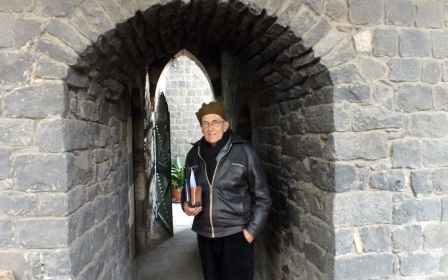Car bomb kills 25 in Syrian city of Homs

Two car bombs killed at least 25 people, including women and children, in a government-held neighbourhood of Syria's central city of Homs on Wednesday, state news agency SANA reported.
Another 100 people were wounded in Karam al-Luz, in attacks SANA blamed on "terrorists," the government's term for people fighting to overthrow President Bashar al-Assad. "Twenty-five people fell as martyrs, including women and children, and more than 107 others were wounded after the explosion of the two car bombs". The Syrian Observatory for Human Rights said the bombings killed 21 people in a mostly Alawite neighbourhood, referring to the Shiite Muslim offshoot sect to which the Assad family belongs.
Videos posted online by activists showed destroyed shopfronts and people panicking and running in all directions as rescuers struggled to extinguish a fire. Syria's uprising began as a series of peaceful protests against the Assad family's four-decade rule but escalated into a full-scale insurgency after the regime launched a devastating crackdown on dissent.
More than 150,000 people have been killed since the revolt began in March 2011 and nine million have been driven from their homes, including 2.6 million international refugees. Homs was an epicentre of the revolt but is now almost entirely in regime hands, with small pockets of rebels holding out in besieged areas in and around the devastated Old City. Earlier Wednesday, troops fighting in the Qalamun region seized the town of Rankus, tightening their grip on the strategic region along the Lebanese border. "Units of the Syrian army have now accomplished their operation in the Rankus area and restored security and stability after eliminating a large number of terrorists," state media said.
The Britain-based Observatory had earlier confirmed that "the army entered the area and is engaged in fierce fighting and heavy shelling." The group, with a network of sources inside Syria, said 28 rebels had been killed in Qalamun area as well as in Eastern Ghouta, elsewhere in Damascus province, in fighting between Tuesday and Wednesday. Troops backed by pro-regime militiamen and Lebanon's Shiite movement Hezbollah have captured most of Qalamun, through which a key highway runs between Damascus and Homs.
Stay informed with MEE's newsletters
Sign up to get the latest alerts, insights and analysis, starting with Turkey Unpacked
Last month, the regime dealt a major blow to the opposition by seizing its last key bastion in the region, the town of Yabrud. The rebels still control a few smaller villages in Qalamun, but have seen their supply lines across the border with Lebanon largely severed.
Syria has been in turmoil since 2011 when a peaceful uprising against President Bashar al-Assad escalated into civil war following a violent regime crackdown. It is estimated that at least 200,000 Syrians are under-siege in government controlled areas while 45,000 are considered to be under siege in opposition controlled areas.
Drought warnings
The United Nations World Food Programme has also expressed concern about the impact of a looming drought in northwest Syria.
WFP is concerned about the impact of a looming drought hitting the northwest of the country -- mainly Aleppo, Idlib, and Hama -- with rainfall less than half of the long-term average and potentially major impacts on the next cereal harvest," said World Food Programme spokeswoman Elisabeth Byrs.
"This could put the lives of millions at risk if the drought continues," she told reporters. Byrs said there were huge concerns about the drought's impact on Syrian agriculture, given that irrigation systems and farm machines have already been hit by the war.
In addition to fears for the cereal sector, there are also worries over the impact of water shortages on livestock farming. "All this comes together to give a picture of a situation that isn't going to get better," Byrs said.
The WFP is currently able to get aid to 4.5 million people in Syria out of the 6.5 million it estimates need help. Byrs said it was not clear how many more people would end up counting on food aid supplies because of the drought.
The affected regions of Syria normally account for more than half the country's annual wheat harvest. According to UN experts, this year's harvest could hit a historic low of between 1.7 million and two million tonnes.
Syria was last hit by a major drought in 2008, three years before the country slid into a civil war that has killed more than 150,000 people and driven nine million from their homes, including the 2.6 million refugees who have fled abroad.
The UN's refugee agency said Tuesday that the numbers crossing the border could rise if there is no rainfall.
Middle East Eye delivers independent and unrivalled coverage and analysis of the Middle East, North Africa and beyond. To learn more about republishing this content and the associated fees, please fill out this form. More about MEE can be found here.




